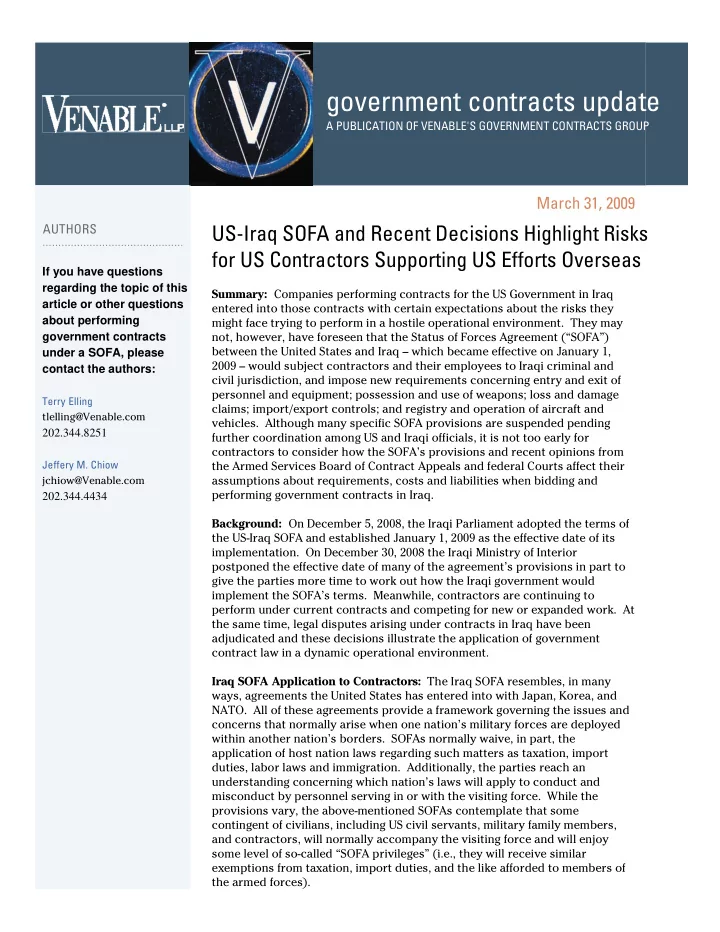

government contracts update A PUBLICATION OF VENABLE'S GOVERNMENT CONTRACTS GROUP March 31, 2009 US-Iraq SOFA and Recent Decisions Highlight Risks AUTHORS ……………………………………… for US Contractors Supporting US Efforts Overseas If you have questions regarding the topic of this Summary: Companies performing contracts for the US Government in Iraq article or other questions entered into those contracts with certain expectations about the risks they about performing might face trying to perform in a hostile operational environment. They may not, however, have foreseen that the Status of Forces Agreement (“SOFA”) government contracts between the United States and Iraq – which became effective on January 1, under a SOFA, please 2009 – would subject contractors and their employees to Iraqi criminal and contact the authors: civil jurisdiction, and impose new requirements concerning entry and exit of personnel and equipment; possession and use of weapons; loss and damage Terry Elling claims; import/export controls; and registry and operation of aircraft and tlelling@Venable.com vehicles. Although many specific SOFA provisions are suspended pending 202.344.8251 further coordination among US and Iraqi officials, it is not too early for contractors to consider how the SOFA’s provisions and recent opinions from Jeffery M. Chiow the Armed Services Board of Contract Appeals and federal Courts affect their jchiow@Venable.com assumptions about requirements, costs and liabilities when bidding and performing government contracts in Iraq. 202.344.4434 Background: On December 5, 2008, the Iraqi Parliament adopted the terms of the US-Iraq SOFA and established January 1, 2009 as the effective date of its implementation. On December 30, 2008 the Iraqi Ministry of Interior postponed the effective date of many of the agreement’s provisions in part to give the parties more time to work out how the Iraqi government would implement the SOFA’s terms. Meanwhile, contractors are continuing to perform under current contracts and competing for new or expanded work. At the same time, legal disputes arising under contracts in Iraq have been adjudicated and these decisions illustrate the application of government contract law in a dynamic operational environment. Iraq SOFA Application to Contractors: The Iraq SOFA resembles, in many ways, agreements the United States has entered into with Japan, Korea, and NATO. All of these agreements provide a framework governing the issues and concerns that normally arise when one nation’s military forces are deployed within another nation’s borders. SOFAs normally waive, in part, the application of host nation laws regarding such matters as taxation, import duties, labor laws and immigration. Additionally, the parties reach an understanding concerning which nation’s laws will apply to conduct and misconduct by personnel serving in or with the visiting force. While the provisions vary, the above-mentioned SOFAs contemplate that some contingent of civilians, including US civil servants, military family members, and contractors, will normally accompany the visiting force and will enjoy some level of so-called “SOFA privileges” (i.e., they will receive similar exemptions from taxation, import duties, and the like afforded to members of the armed forces).
• A key difference between the Iraq SOFA and most other SOFAS, however, greatly diminishes the privileges afforded to contractors and their employees working in Iraq. Under the Iraq SOFA, “‘Member of the civilian component’ means any civilian employed by the United States Department of Defense” unless that person ordinarily resides in Iraq. The terms ‘United States contractors’ and ‘United States contractor employees’ are separately defined as “non-Iraqi persons or legal entities, and their employees, who are citizens of the United States or a third country…in Iraq to supply goods, services, and security in Iraq to or on behalf of the United States Forces under a contract or subcontract with or for the United States Forces” unless the person or entity ordinarily resides in Iraq. • This definitional distinction under normal rules of interpretation means that protections available to members of the US armed forces and DOD civilians—collectively “United States Forces”—do not apply to contractors or their employees. Potentially more troubling is that the definition of United States contractors appears only to apply to DOD contractors. Thus, the few privileges afforded DOD contractors are not clearly available to contractors working for the State Department, US AID and other agencies. Key Provisions of the Iraq SOFA: Key privileges available to United States Forces and the Civilian Component are either unavailable to contractors or, in some instances, it is unclear whether contractors enjoy the same privileges. Those privileges include: • Right to possess and carry weapons; • Entry into and exit from Iraq with ID card and military travel orders; • Import and export of reasonable quantities of personal items; • Exemption from fees to use transmission airwaves; • Iraqi authorities accept the registration and license for “Official Vehicles of the US Forces”; • Government aircraft and DOD-contracted civil aircraft are not subject to taxes, duties, overflight charges, navigation, landing or parking fees; • Iraqi authorities must notify the US within 24-hours of arrest or detainment by Iraqi authorities and handover to US authorities; • US tort law covers claims for damages to third parties; and • Primary US legal jurisdiction and US due process for all except grave premeditated felonies occurring off-duty and outside agreed facilities The above privileges assure relative ease of movement, freedom from Iraqi bureaucracy, exemption from fees and taxes, and the protections of the US legal system in all but the most egregious cases. Without these privileges, contractors and their employees face considerable risk, both in terms of personal security and impact on their ability to perform contracts at the level of effort and costs they anticipated when originally bidding on such work. Contractors must take these factors into account going forward. Recent Legal Decisions: Two significant series of cases involving performance under contracts in Iraq have been the subject of recent Board and Court decisions that underscore the risks faced by contractors performing in a hostile operational environment. In the first, several contractors making deliveries of fuel or other supplies have made claims for
Recommend
More recommend